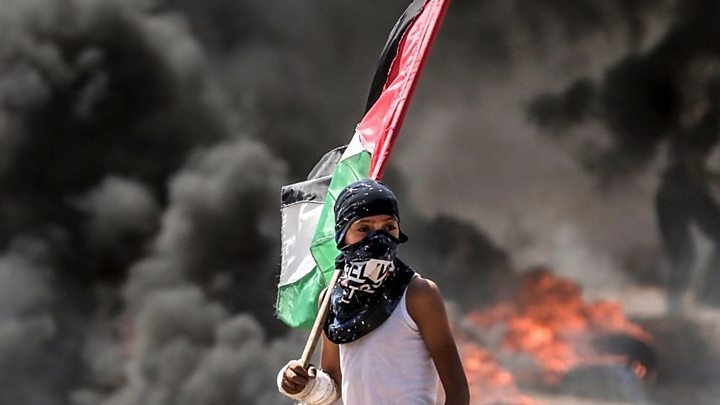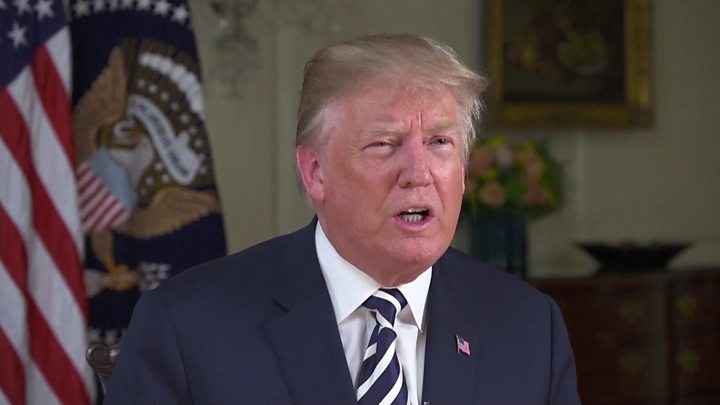
Funerals are to be held in Gaza for 58 people killed on Monday when Israeli troops opened fire on Palestinian protesters, in the deadliest day of violence there since a war in 2014.
The burials coincide with the 70th anniversary of what Palestinians call the Nakba - the mass displacement of Palestinians after Israel's creation.
Israel's military said it was preparing for further confrontations on Tuesday.
But Palestinian groups indicated they intended to rein in the protests.
Monday's violence came as the US inaugurated its first embassy in Jerusalem, a controversial move that broke with decades of US policy and incensed Palestinians.
Palestinians claim East Jerusalem as the capital of a future Palestinian state, and see the US move as backing Israeli control over the whole of the city - which Israel regards as its indivisible capital.
Palestinian officials said that, as well as those killed, about 2,700 people were injured in Monday's violence - which they condemned as a massacre.
Israeli PM Benjamin Netanyahu said his military was acting in self-defence against Gaza's Islamist rulers, Hamas, who he said wanted to destroy Israel.
But the United Nations human rights office was was heavily critical of Israel's use of force.
"The mere fact of approaching a fence is not a lethal, life-threatening act, so that does not warrant being shot," spokesman Rupert Colville told reporters in Geneva on Tuesday.
"How much threat can a double amputee be making from the other side of a large fortified fence?" he added.
What happened at the Gaza border?
Palestinians were demonstrating on Monday as they have been for seven weeks, as part of a protest orchestrated in part by Hamas and branded the "Great March of Return".
But Monday's protests - and those planned for Tuesday - mark the anniversary of Israel's creation in 1948 and commemorate the hundreds of thousands of Palestinians who subsequently fled their homes or were displaced in the war that followed.
Israel said some 40,000 Palestinians had taken part in "violent riots" at 13 locations along Israel's security fence along Gaza's eastern border.
Palestinians hurled stones and incendiary devices and approached the border fence. Israeli snipers fired live ammunition at protesters and used tear gas dispersed from drones.
Mr Netanyahu defended the military action. "Every country has an obligation to defend its borders," he said.
"The Hamas terrorist organisation declares its intention to destroy Israel and sends thousands to breach the border fence in order to achieve this goal," he said. "We will continue to act with determination to protect our sovereignty and our citizens."
Hamas did not initiate the weekly protests that have been taking place for the past seven weeks, but the group has since become the driving force. At the end of March, Hamas' leader in Gaza, Yahya Sinwar, said the demonstrations were aimed at removing what he called the "transient border" with Israel.
Hamas has called for Israel's destruction and is in a permanent state of conflict with the Jewish state.
An Israel Defense Forces (IDF) spokesman said soldiers had fired on people carrying out "terrorist activity and not on demonstrators, who were dispersed by usual means such as tear gas and according to the rules of engagement".
Announcing three days of mourning, the West Bank-based Palestinian Authority President Mahmoud Abbas said: "Today once again, the massacres against our people continue."
How did the world react?
Israel's actions were condemned or criticised by the UK, France, Germany, Turkey, Lebanon and other nations. Israel was defended by its key ally, the US. President Donald Trump and US Secretary of State Mike Pompeo chose not to directly address the deadly violence in Gaza.
- White House spokesman Raj Shah said: "The responsibility for these tragic deaths rests squarely with Hamas... Hamas is intentionally and cynically provoking this response"
- Kuwait drafted a UN Security Council statement calling for an independent inquiry into the violence - and expressing "outrage and sorrow" - but this was blocked by the US
- The UK said "the large volume of live fire is extremely concerning" but called on protesters to act peacefully
- Germany said Israel had the right to defend itself but should do so proportionately
- France's President Emmanuel Macron condemned violence by the Israeli military
- Turkey said the US shared responsibility with Israel for a "vile massacre" and that it was recalling its ambassadors from both countries
- South Africa also recalled its ambassador to Israel, condemning "the indiscriminate and grave manner of the latest Israeli attack"
The violence and the embassy opening
The violence in Gaza and the US embassy opening were not explicitly linked, but both were timed to coincide with Israel's 70th anniversary on Monday.
Commentators drew attention to the stark contrast between the images from Jerusalem - of a high-level US delegation, alongside Mr Netanyahu and his wife, celebrating the new US embassy opening - and the violent images emerging from Gaza.

The relocation breaks with decades of US policy and has incensed Palestinians and other nations, who say it violates international law.
Palestinians claim East Jerusalem as the capital of a future Palestinian state, and see the US move as backing Israeli control over the whole of the city.
The Palestinian president, Mahmoud Abbas, called the new embassy "a US settlement in East Jerusalem".